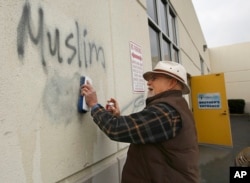Hate crimes targeting Muslim Americans were up nearly 600 percent from 2014 to 2016, fueled in part by anti-Islam rhetoric during the 2016 U.S. presidential election, according to a Muslim advocacy group.
In a report released Tuesday, the Council on American Islamic Relations said there were 260 anti-Muslim hate crimes in 2016, up from 180 in 2015 and 38 in 2014, a 584 percent increase for the three-year period.
Overall anti-Muslim bias cases — identified as any incident in which there was an element of religious bias, such as a slur — reached 2,213 in 2016, up from 1,409 in 2015 and 1,314 in 2014. That's nearly a 70 percent increase for the three-year period.
Corey Saylor, a CAIR spokesman and co-author of the report, said his findings underlined the increasingly violent face of anti-Muslim bias in the United States.
The contempt used to be directed at blocking mosque constructions, but "unfortunately, nowadays people are going out and targeting Muslims for assault, vandalizing or attempting arsons on mosques," Saylor said.
Harassment most common
While hate crimes made up 12 percent of all anti-Muslim bias incidents in 2016, harassment was the most common category, accounting for 18 percent of cases, followed closely by incidents during which Muslims were "questioned by FBI employees or otherwise appeared to be inappropriately targeted by the agency."
Saylor said that shortly before the November 8 election, an unusually large number of Muslim Americans reported being visited by FBI agents and asked about a vague terror plot.
They were asked "questions that in the assessment of our intake staff were not connected to any specific investigation," he said at a news conference. "We did not see any similar type of outreach to, say, Trump supporters who were documented as making a number of threats."
The FBI dismissed the suggestion that it targeted Muslims.
"The FBI investigates activity which may constitute a federal crime or pose a threat to national security," FBI spokesman Matthew Bertron said. "Our focus is not on membership in particular groups but on criminal activity."
The CAIR report, The Empowerment of Hate, includes a panoply of highly publicized hate crimes and lesser known bias incidents phoned into the organization's chapters around the country.
In one widely reported incident, federal authorities charged three members of a white militia group last year with conspiring to blow up an apartment complex where Somali immigrants lived and worshipped.
In another episode, a Muslim-owned restaurant in Galveston, Texas, was vandalized with bacon twice in one week.
Veteran's experience
And in a case of harassment, a disabled U.S. Army veteran of the Iraq War discovered his restroom locker vandalized with the words "terrorist" and "raghead."
The wearing of the Islamic hijab or headscarf set off 346 bias incidents in 2016, representing the second most common trigger for anti-Muslim bias incidents after ethnicity and national origin, according to the report.
"Unfortunately, a very common reason that people get targeted is simply wearing something that identifies with a particular religious faith," Saylor said.
The report came after the release of data showing an uptick in hate crimes in the past two years after more than a decade of declines. In its most recent report, released in November, the FBI showed a 23 percent increase in religious-based hate crimes in 2015, including a 67 percent rise in crimes targeting Muslims and a 9 percent increase in anti-Jewish hate crimes.
CAIR says the trend has continued into this year. During the first quarter of 2017, the organization recorded 35 incidents involving mosques, including arson and vandalism, and 193 cases of alleged profiling of Muslims by Customs and Border Protection, up from 17 incidents during the first quarter of last year.
In a statement emailed to VOA, a CBP spokesperson rejected the allegations made by CAIR and said the agency "does not discriminate based on religion, race, ethnicity or sexual orientation."
Senators' letter
The recent rise in religious hate crimes, including a wave of threats targeting Jewish community centers and schools, led all 100 U.S. senators to write a letter to law enforcement officials in March, urging them to do more to counter it.
Last week, the Senate Judiciary Committee held a hearing on religious hate crimes, with some members calling for new legislation to combat them.
Eric Treene, the Department of Justice's special counsel for religious discrimination, reassured lawmakers that Attorney General Jeff Sessions was deeply committed to fighting hate crime as part of his campaign against violent crime.
"He's consistently given us the encouragement to pursue these cases vigorously," Treene said.





